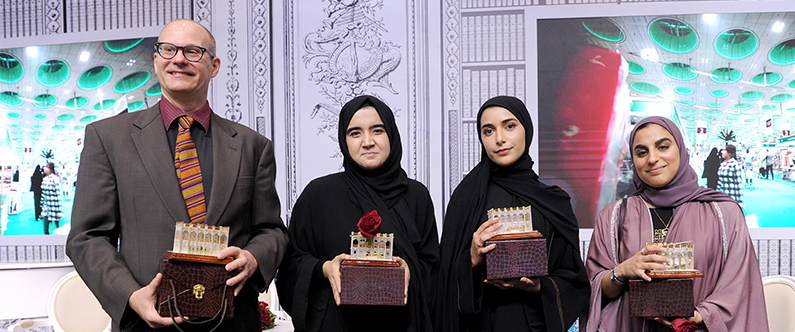WCM-Q students take the stage at Doha International Book Fair
 Dr. Alan Weber, WCM-Q professor of English, with WCM-Q students Sumaya AlMaraghi, Saadah Al-Mohannadi and Nojoud Al-Ansari at the Doha International Book Fair.
Dr. Alan Weber, WCM-Q professor of English, with WCM-Q students Sumaya AlMaraghi, Saadah Al-Mohannadi and Nojoud Al-Ansari at the Doha International Book Fair.
Three Weill Cornell Medicine-Qatar (WCM-Q) students joined novelist and physician Dr. Amir Tag Elsir on stage at Doha International Book Fair for a seminar that examined how creative writing helps doctors understand the moral and ethical dimensions of medicine.
Second-year pre-medical students Nojoud Al-Ansari and Saadah Al-Mohannadi joined second-year medical student Sumaya AlMaraghi to discuss the links between the arts, literature and medicine with reference to their own contributions to Qira’at, a collection of essays, poems, short stories and other works, which is published annually by WCM-Q.

The Doctors and Authors seminar session, which was hosted jointly by Dr. Amir Tag Elsir and Dr. Alan Weber, WCM-Q professor of English, began with introductory presentations by each of the students. Nojoud spoke about her essay, which examined the themes of compassion, justice and care in the song How Much a Dollar Cost by Kendrick Lamar, in which the artist recounts his refusal to give money to a beggar because he suspected he would use it to buy drugs, and his subsequent regret at judging a fellow human being in need so harshly. Nojoud said: “The song reminds us to be kind and compassionate without judgment, which is an important lesson for us as students who will one day be doctors. Exploring moral dilemmas like this through stories in music and literature is really helpful for us as future doctors.”
Saadah discussed the value of listening to the stories that patients and their families tell, and the danger of disregarding them by focusing solely on evidence from tests and other data, which can cause doctors to miss crucial details. Sumaya spoke about the capacity of the arts for reminding physicians that the practice of medicine goes beyond having an advanced understanding of science and anatomy and in fact has a strong emotional and spiritual component. “Art reminds us that we are treating people, not a set of symptoms,” she said.
Dr. Elsir is a Sudanese writer who has published more than a dozen books, including novels, poetry collections and non-fiction works. His novel The Hunter of the Chrysalises was nominated for the 2011 Arabic Booker Prize. Dr. Weber is one of the editors of Qira’at and is an expert on narrative medicine.
Dr. Weber said: “The role of narrative is absolutely central to the practice of medicine, both in a practical sense of being able to listen to patients and take an accurate medical history, and in a more abstract sense, in that art, literature, music and film can give doctors an understanding of the moral and ethical foundations that underpin what it means to be a caregiver.”

